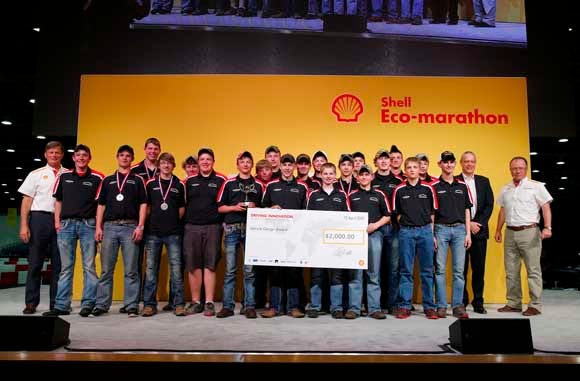7 renewable energy projects that might just change the world
From people-powered football pitches in Nigeria and safer lamplight for families in Kenya to recycled coffee in Cambridgeshire, the future is bright.

A student attending Shell’s Energy Lab Europe in 2014
Here are seven examples of energy initiatives that might just save the world.
1. GravityLight 2
Kerosene lamps, commonly used in communities that don’t have a regular electricity supply, can cause side effects including cataracts and even cancer. For many families, though, this is the only source of light they have.
1.3 billion people across the world rely on kerosene lamps when the sun goes down. It might be unhealthy, but it’s vastly expensive too — some families spend up to 30% of their income lighting their homes via kerosene. It’s a dangerous — potentially lethal — and a huge poverty trap.
There might be a solution, though.
GravityLight is, according to its founders, a “low cost, safe and reliable alternative to the kerosene lamp — one that costs nothing to run, doesn’t need batteries and pays for itself within weeks.” It works by turning gravity into light — something that humans have been doing, for example in clocks, for hundreds of years.
The GravityLight came to be in 2013, and was trialled in 26 different countries across the world — leading to 98% of those who tested it saying they’d use it over a kerosene lamp.
Now, a stronger and easier to use version — the GravityLight 2 — is promising to take the invention even further. In Kenya, new staff are being trained to build the lights, meaning more of them can be rolled out to local families more quickly, and sustainable jobs can be created within communities.
The GravityLight 2 campaign on IndieGogo has so far raised $400,927–128% of its target amount.
Watch the video below to learn more about the campaign:
<iframe title=”vimeo-player” src=”https://player.vimeo.com/video/128164082" width=”640" height=”360" frameborder=”0" allowfullscreen></iframe>
See the GravityLight 2: Made in Africa IndieGoGo page here.
2. bio-bean
bio-bean has industrialised t6he process of recycling waste coffee grounds by turning them into advanced biofuels — a solution to both the waste disposal problem and the burning of fossil fuels.
It’s a “clean technology” company, working within existing energy and waste infrastructures. It’s grown hugely since its launch in 2014, and its Cambridgeshire factory can now process 50,000 tonnes of ground per year, and is extending its research into creation of liquid fuels and biochemicals.
Find out more about bio bean here: http://www.bio-bean.com
3. The Shell Concept Car
Shell have built a car with the aim of reducing energy usage in the transport sector. Using geotechnology, the energy efficient car reduces emissions in a society where more and more cars appear in the roads every day.
In the below video, Professor Gordon Murray discusses the thought process behind the Concept Car in more detail…
4. Shell Springboard
Shell Springboard is a low carbon innovation award for UK entrepreneurs.
Three regional winners will receive £40,000 each to fund their projects, before An overall winner is announced. They will then receive an extra £110,00 — meaning that the overall national winner of Shell Springboard 2016 will receive a total of £150,000 of no-strings-attached funding to help scale up its low-carbon innovation.
Entries must outline a business idea that is both commercially viable and will reduce carbon emissions.
This year the judging panel includes University of Cambridge Professor David Newbery, CBE, the Research Director of the Cambridge Electricity Policy Research Group, Kelsey Lynn Skinner, of Director Technology Ventures, Imperial Innovations, and Roy Williamson, Technology Specialist at Venture Capital Unit, UK Trade and Investment (UKTI).
Entries have closed for the 2016 competition, but it’s not too early to start thinking up ideas for next year. Find out more about Shell Springboard here: http://www.shellspringboard.org/
5. Pavegen
Or, light-up football pitches.
Sounds interesting? We’d agree. Pavegen is bringing the first “people-powered football pitch” to Nigeria, where kerosene lamps have previously been used for lighting — which for the reasons already mentioned, isn’t exactly ideal.
Pavegen uses the power of footsteps to light both sports pitches and the wider community. Every time a player walks on the pitch, a small amount of electricity is created — which can then be channelled into light.
The longer term aim is to teach children in Africa to think creatively about energy, and how it can be generated.
Find out more about Pavegen here: http://www.pavegen.com/
6. Ideas360
What if waves powered boats? What if tomatoes produced energy? And what if footsteps created light — like they already are doing in Kenya, with Pavegen?
When it comes to sustainable energy, no idea is impossible. Shell’s Ideas360 competition — a “global ideas competition” that believes that the simplest of ideas have the potential to transform society — is on a mission to unlock innovative thinking and ingenuity in students across the world.
The competition allows talented students to work on their sustainable energy ideas with Shell mentors. One winner will have the opportunity to explore the world on an adventure with National Geographic.
Find out more about Ideas360 here: http://www.shellideas360.com
7. Shell Eco Marathon

Last but not least, it’s the Shell Eco Marathon — an international event that sees students from across the world compete to build a car and go as far as they can, using as little energy as possible.
This year, the Shell Eco Marathon is taking place at Make the Future London — a free festival of energy ideas and innovation that will take place at Stratford’s Olympic Park from 30th June — 3rd July.
Read more about Make the Future London and get your free tickets here.
Originally published at https://www.thenationalstudent.com.
